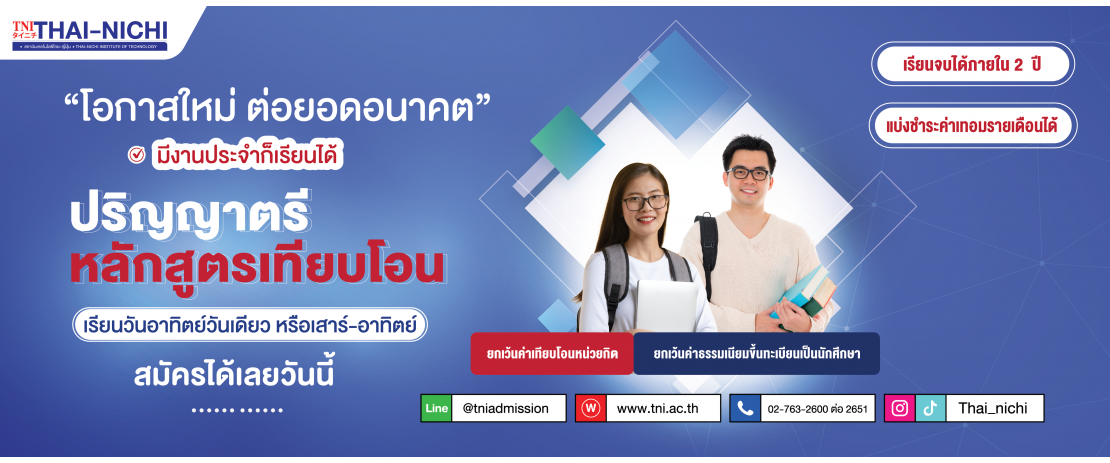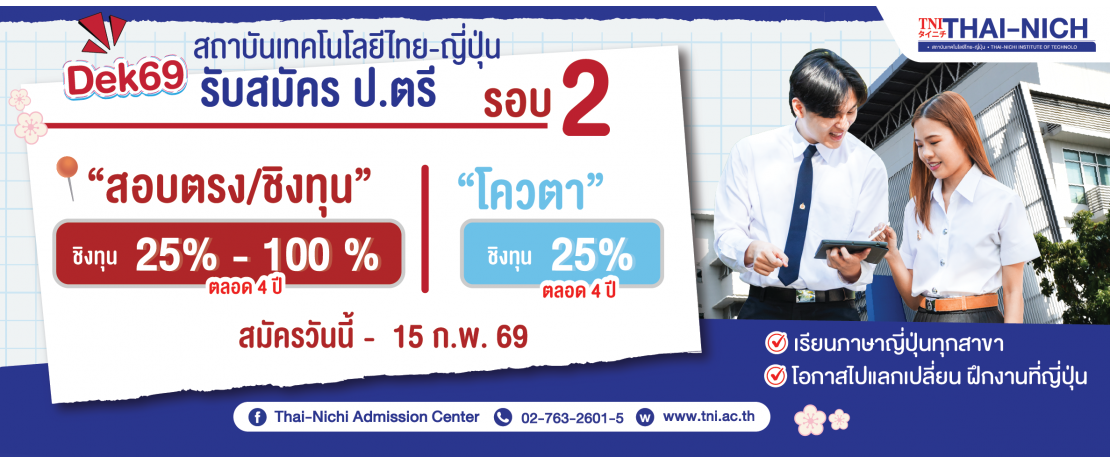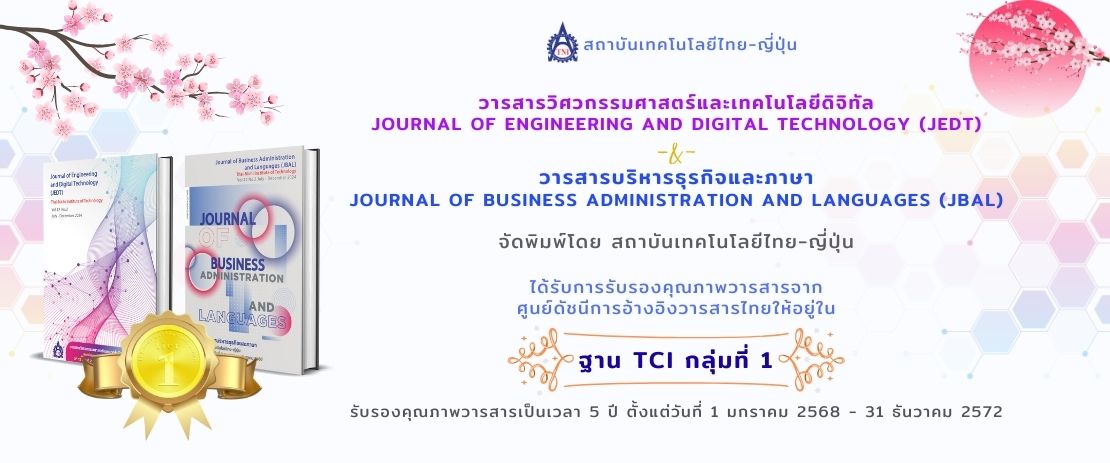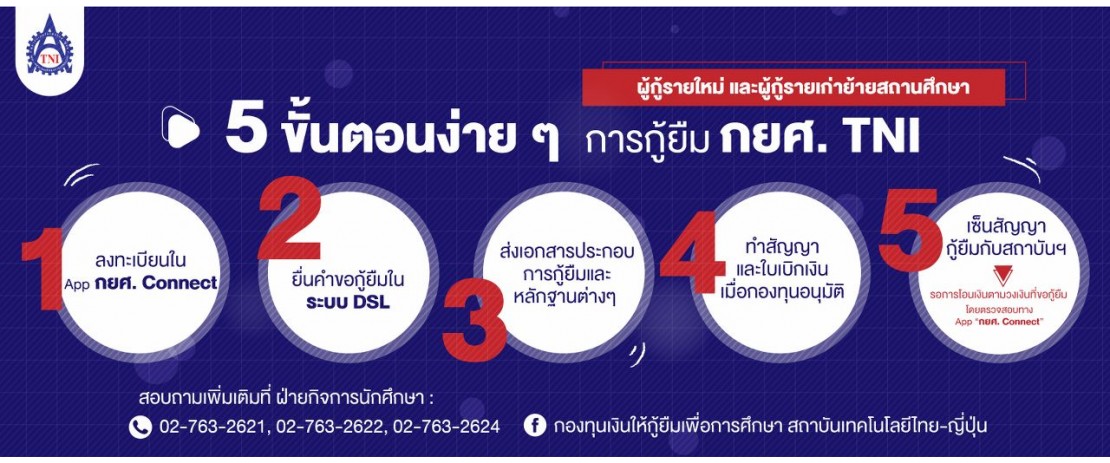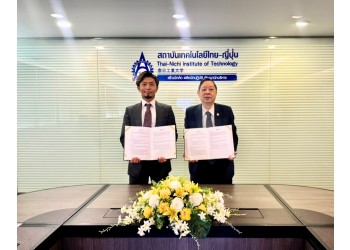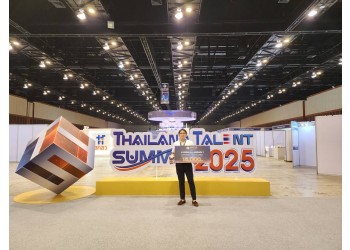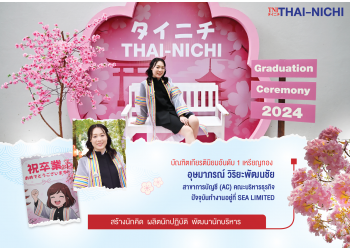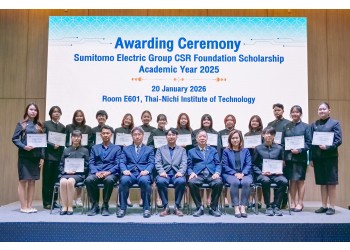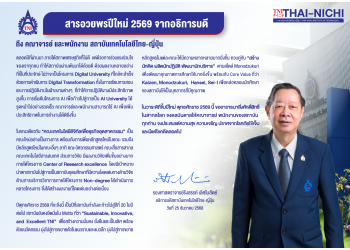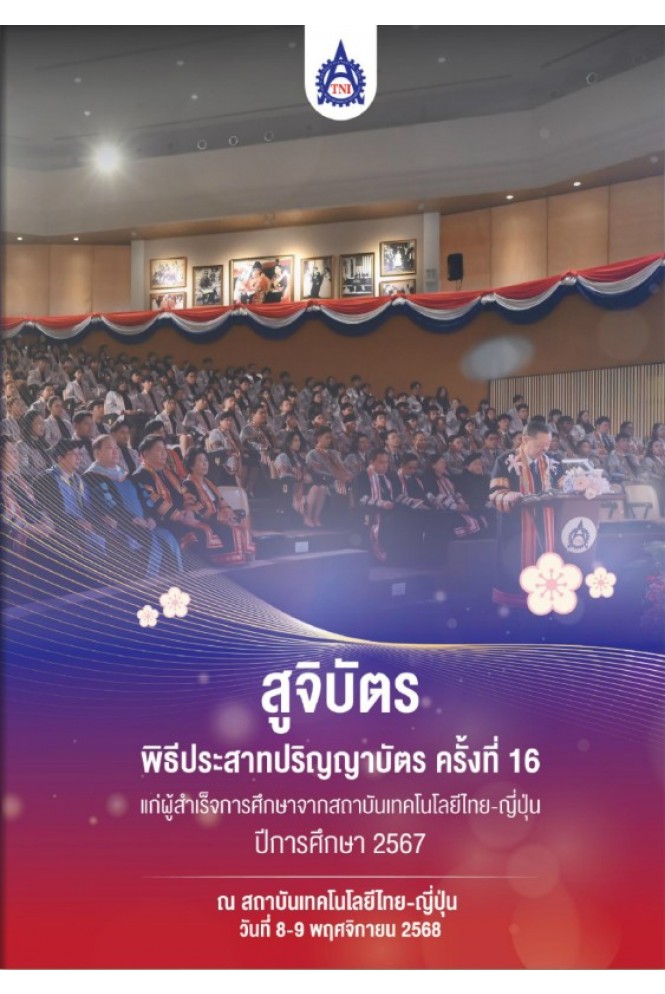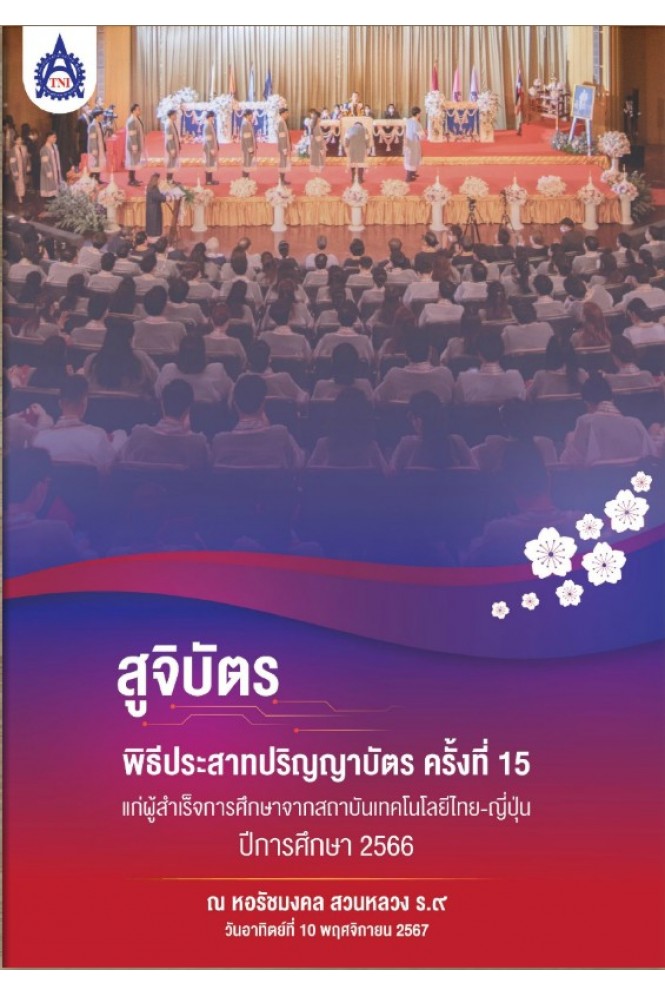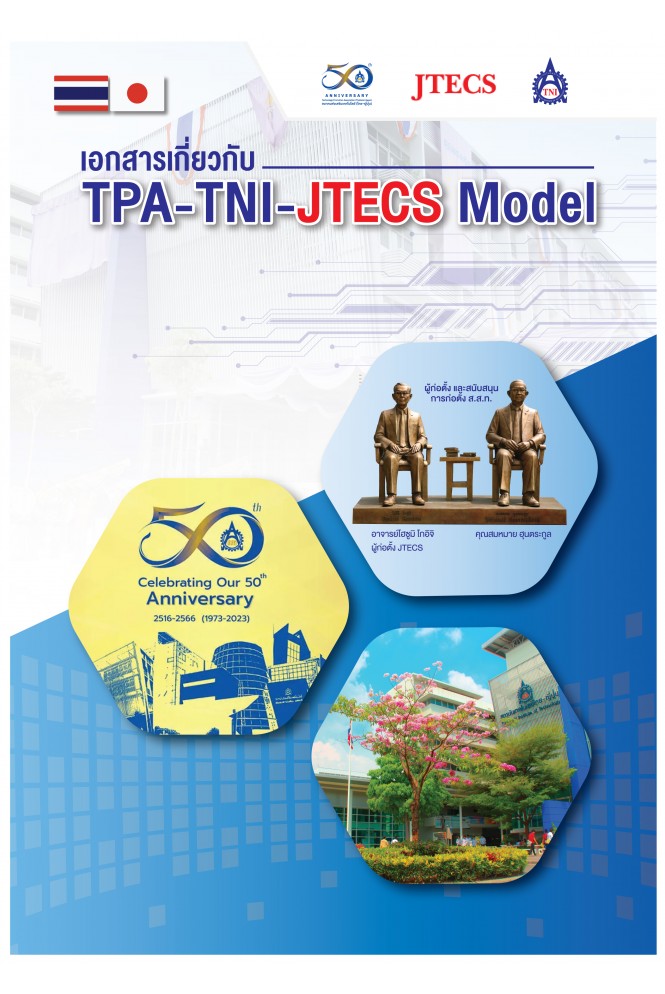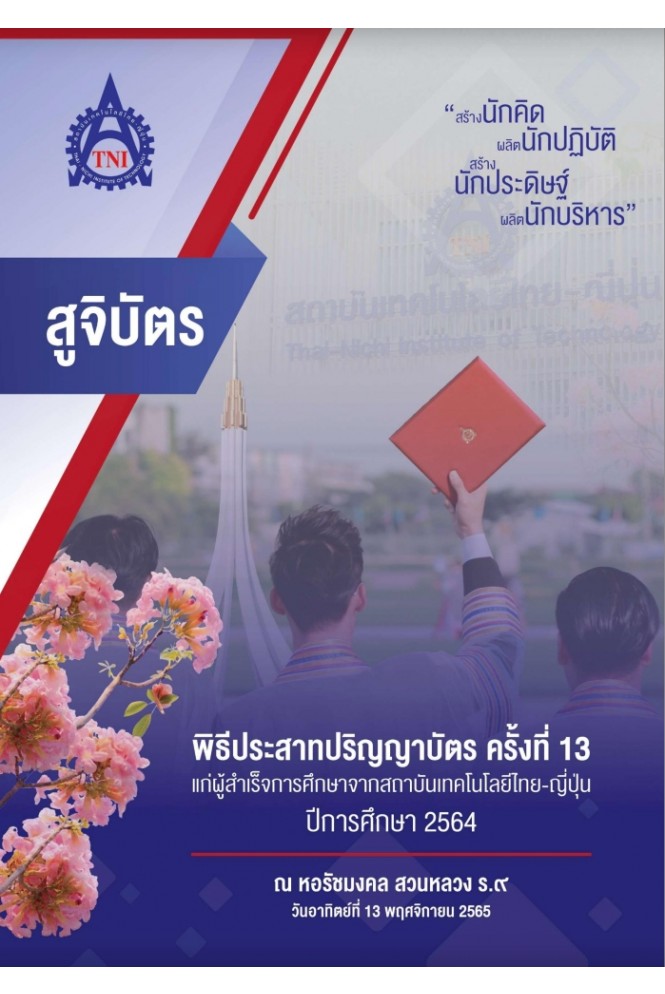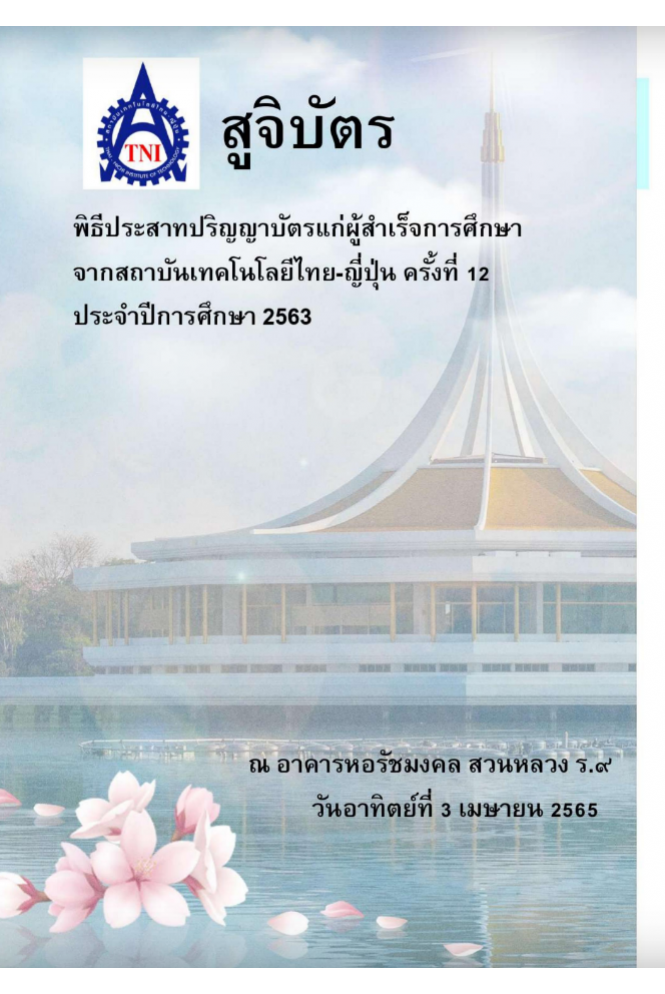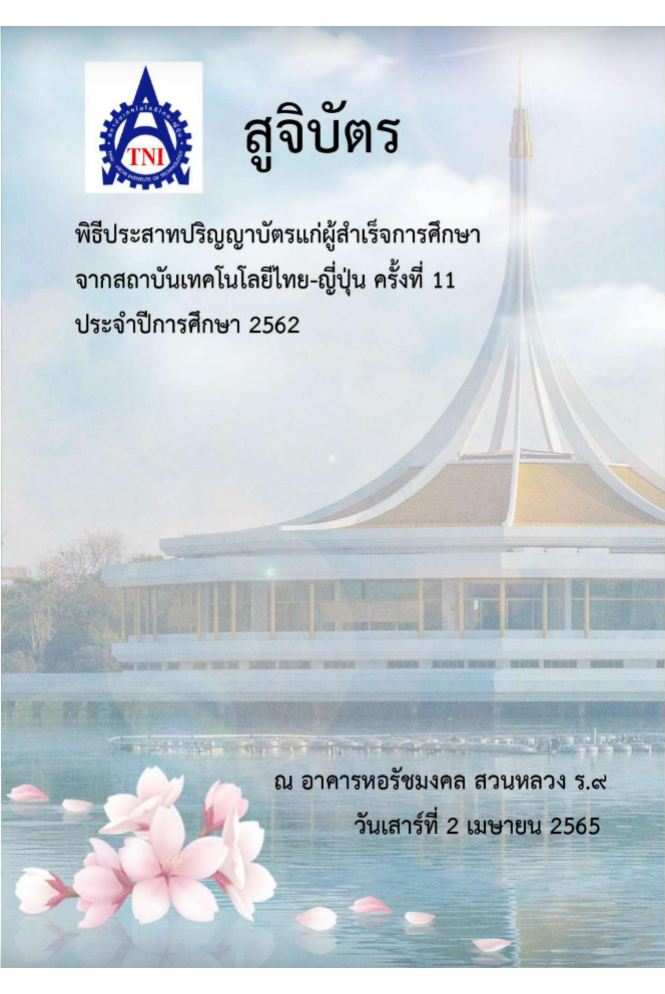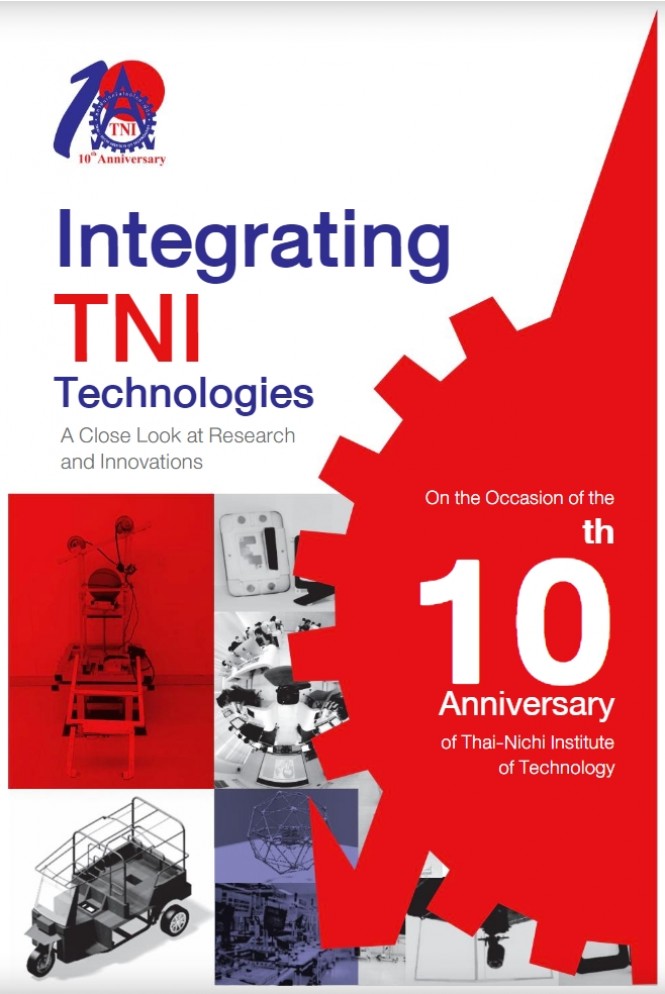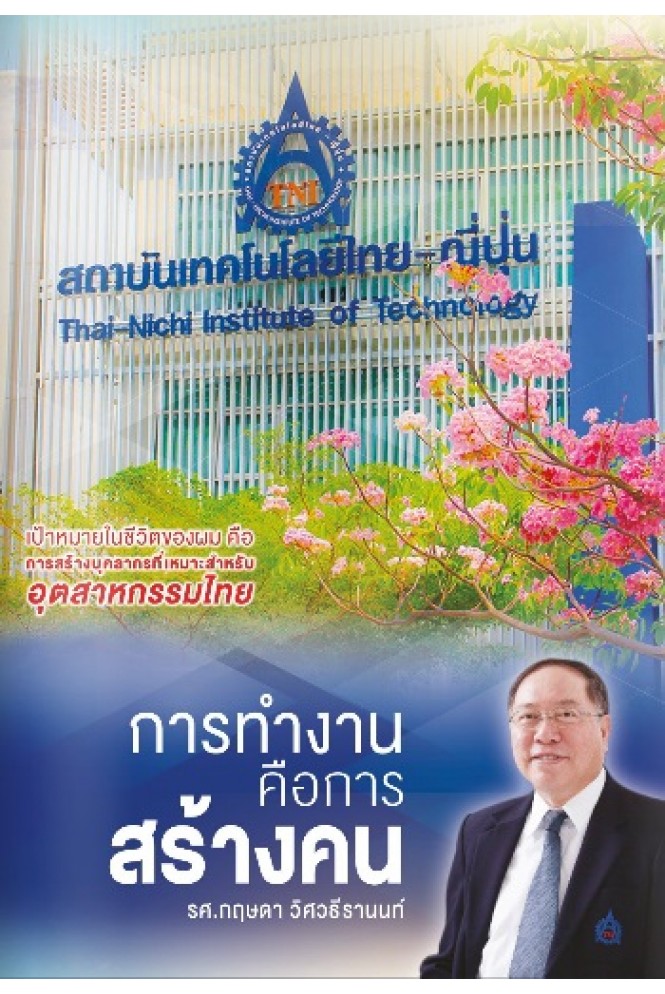






Why Choose TNI
เรียน TNI ได้อะไรมากกว่า
องค์กรผู้ให้การสนับสนุน
สถาบันเทคโนโลยีไทย-ญี่ปุ่น
ศิษย์เก่า

" การทำงานให้ได้งานและมีความสุข จะต้องหาสิ่งที่ตัวเองรักในงานให้เจอ และเราจะสนุกพร้อมกับมีความสุขในการทำงาน "
นางสาวชญากชมน สิทธากุลวรา สาขาวิศวกรรมคอมพิวเตอร์และปัญญาประดิษฐ์ (CE) คณะวิศวกรรมศาสตร์
นักศึกษาเหรียญทองเกียรตินิยม ปีการศึกษา 2564
ปัจจุบันทำงาน NDR Solution (Thailand) Co.,Ltd.

" ความสำเร็จในชีวิตไม่มีสูตรตายตัว การเรียนรู้ก็เช่นกัน สิ่งสำคัญที่สุด คือ ต้องเข้าใจตัวเองว่าชอบการเรียนรู้ในรูปแบบไหน แล้วใช้เวลาทำความเข้าใจในแบบฉบับของเรา "
นายปวเรศ เจียเจริญ สาขาเทคโนโลยีสารสนเทศทางธุรกิจ (BI) คณะเทคโนโลยีสารสนเทศ
นักศึกษาเหรียญทองเกียรตินิยม ปีการศึกษา 2564
ปัจจุบันทำงาน บริษัท ไบร์ท แอนด์ เบทเทอร์ จำกัด

" ความตั้งใจบวกกับความอดทน ทำให้เกิดความสำเร็จในการเรียนและการทำงาน "
นายวสันต์ ชูเสน สาขาการจัดการธุรกิจระหว่างประเทศ (IB) คณะบริหารธุรกิจ
นักศึกษาเหรียญทองเกียรตินิยม ปีการศึกษา 2564
ปัจจุบันทำงาน บริษัท พนัส แอสเซมบลีย์ จำกัด

" การเรียนนั้น ความสำคัญอยู่ที่ตัวผู้เรียน และความกระตือรือร้นที่สามารถทำให้ประสบความสำเร็จ "
นางสาวศิรภัทร์ ชุมสาย ณ อยุธยา สาขาเทคโนโลยีดิจิทัลทางสื่อสารมวลชน (DC) คณะเทคโนโลยีสารสนเทศ
นักศึกษาเหรียญทองเกียรตินิยม ปีการศึกษา 2564
ปัจจุบันทำงาน Somnuk Production Co.,Ltd. และช่อง YouTube : Art Thomya

" ประทับใจอาจารย์หลายๆ ท่าน ที่ให้ความรู้ทางด้านวิชาการและประสบการณ์มากมาย เป็นที่ปรึกษาและคอยชี้แนะแนวทางในด้านต่างๆ "
นายเอกรัชต์ จบเจนไพร สาขาวิศวกรรมดิจิทัล (DGE) วิทยาลัยนานาชาติ
นักศึกษาเหรียญทองเกียรตินิยม ปีการศึกษา 2564
ปัจจุบันทำงาน Gosoft (Thailand) Co., Ltd.

" เลือกเรียน TNI เพราะชอบรูปแบบการเรียนการสอนในสไตล์ญี่ปุ่น และการเรียนรู้วัฒนธรรมญี่ปุ่น "
นายณภัทร ผิวไผ่ สาขาการบัญชี (AC) คณะบริหารธุรกิจ
นักศึกษาเหรียญทองเกียรตินิยม ปีการศึกษา 2564
ปัจจุบันทำงาน บริษัท สำนักงาน อีวาย จำกัด

" เรียนการตลาดดิจิทัล ได้ความรู้เกี่ยวกับมีเดียที่หลากหลายและกว้างขวาง ได้ฝึกความคิดสร้างสรรค์ รู้ทันเทรนด์มีเดีย ช่วยให้การทำงานง่ายขึ้นเพราะตรงกับอาชีพที่ทำจริงๆ "
นายมหัสชคุณ ชาวโพธิ์ สาขาการตลาดดิจิทัล (DM) คณะบริหารธุรกิจ
ปันจุบันทำงาน Punpromotion Co., Ltd.

" เวลาท้อ ขอให้คิดเสมอว่า เราต้องทำได้นะ แค่พยายามเยอะหน่อย แต่อย่ากดดันตัวเอง ไม่ต้องเปรียบเทียบตัวเองกับคนอื่น เราต้องทำให้เต็มที่ และชนะใจตัวเองให้ได้ เท่านี้เราก็ภูมิใจที่เราทำได้ "
นางสาวอรวรา หมั่นวิชาชัย สาขาการจัดการธุรกิจระหว่างประเทศ (IB) คณะบริหารธุรกิจ
ปัจจุบันทำงาน บริษัทเชลล์แห่งประเทศไทย จํากัด

" Be patient, your time will come. ตั้งเป้าหมายในชีวิต ทุกอย่างจะประสบความสำเร็จได้อย่างแน่นอน "
นางสาวภศิชา พิมพ์กิ สาขาการบัญชี (AC) คณะบริหารธุรกิจ
ปัจจุบันทำงาน Netizen Co., Ltd.

" ได้เรียนภาษาญี่ปุ่นควบคู่ไปกับการฝึกทักษะการทำงานด้านโลจิสติกส์ รวมถึงมีทุนการศึกษาสนับสนุนอีกมากมาย "
นางสาวกุลนิษฐ์ ทวีทรัพย์ประทาน สาขาการจัดการโลจิสติกส์และโซ่อุปทาน (LM) คณะบริหารธุรกิจ
ปัจจุบันทำงาน บริษัท ซีพีเอฟ เทรดดิ้ง จำกัด

" เคล็ดลับความสำเร็จในการเรียน ความสม่ำเสมอ คือสิ่งที่สำคัญ พยายามทำทุกวันไม่ให้ขาด ตั้งเป้าหมายให้ชัดเจน วัดผลได้ ติดตามได้ อยู่ในขอบเขตที่เราทำได้ ภายในเวลาที่กำหนด "
นายโชติภูมิ ศรีชู สาขาบริหารธุรกิจญี่ปุ่น (BJ) คณะบริหารธุรกิจ
ปัจจุบันทำงาน บริษัท พาวเวอร์ไปป์ จำกัด

" ได้เรียนรู้การบริการสไตล์ญี่ปุ่นแบบ Omotenashi (โอโมเทะนาชิ) ควบคู่ไปกับการเรียนรู้ภาษาที่ 3 และได้ทดลองทำบริษัทจำลองเพื่อฝึกการทำงานเป็นทีมที่สามารถนำไปใช้กับการทำงานได้จริง "
นางสาวปัณรส เอี่ยมสิทธิพันธุ์ สาขาการจัดการการท่องเที่ยวและการบริการเชิงนวัตกรรม (TH) คณะบริหารธุรกิจ
ปัจจุบันทำงาน บริษัท เอช.ไอ.เอส. ทัวร์ส์ จำกัด

" ตั้งเป้าหมาย ให้ชัดเจน คิดจะทำอะไรให้เริ่มเลยโดยไม่ต้องรอทุกอย่างพร้อมและเรียนรู้จากข้อผิดพลาดที่เกิดขึ้น "
นายฐตพล บุญทองขาว สาขาวิศวกรรมการผลิต (PE) คณะวิศวกรรมศาสตร์
บัณฑิตเกียรตินิยมอันดับ 1 เหรียญทอง ปีการศึกษา 2565
ปัจจุบันทำงานที่ Hirate Technical Co., Ltd. ประเทศญี่ปุ่น

" การแบ่งเวลาพัฒนาตัวเองอย่างสม่ำเสมอ ฝึกประสบการณ์นอกหลักสูตร การพัฒนาทักษะด้านภาษา สิ่งเหล่านี้ล้วนมีประโยชน์สำหรับการประกอบอาชีพในอนาคต "
นายกันต์ปพนธ์ เหลืองอร่าม สาขาวิศวกรรมยานยนต์ (AE) คณะวิศวกรรมศาสตร์
บัณฑิตเกียรตินิยมอันดับ 1 เหรียญทอง ปีการศึกษา 2565
ปัจจุบันทำงานที่ Honda Automobile (Thailand) Co., Ltd.

" ทุกความท้าทายคือ โอกาสในการเติบโต เรียนรู้ และก้าวหน้าขึ้น "
นางสาวธัญสินี พิชัยบัณฑิตกุล สาขาเทคโนโลยีสารสนเทศ (MIT) คณะเทคโนโลยีสารสนเทศ
มหาบัณฑิตเกียรตินิยมเหรียญทอง ปีการศึกษา 2565
ปัจจุบันทำงานอยู่ที่ Amari Bangkok Hotel

" อย่าเพิ่งรีบตัดสินตัวเองว่าทำไม่ได้จนกว่าจะได้ลงมือทำ "
นางสาวรมณ ทองรักษ์ สาขาเทคโนโลยีดิจิทัลทางสื่อสารมวลชน (DC) คณะเทคโนโลยีสารสนเทศ
บัณฑิตเกียรตินิยมอันดับ 1 เหรียญทอง ปีการศึกษา 2566
ปัจจุบันทำงานอยู่ที่ GMM Music Co., Ltd.

" ทำงานและเติมความสุขให้ตัวเองอย่างเต็มที่ พร้อมจะเรียนรู้สิ่งใหม่ๆ อยู่เสมอ "
นายวรพงษ์ ศรีสอาด สาขาวิศวกรรมคอมพิวเตอร์และปัญญาประดิษฐ์ (CE) คณะวิศวกรรมศาสตร์
บัณฑิตเกียรตินิยมอันดับ 1 เหรียญทอง ปีการศึกษา 2566
ปัจจุบันทำงานอยู่ที่ TOYOTA MOTOR ASIA (THAILAND) CO., LTD.

" ไม่มีอะไรยากเกินความสามารถ ขอแค่เราเชื่อมั่นและมีความกล้าที่จะลงมือทำ "
นางสาวพันณษา สอดห่วง สาขาการตลาดเชิงสร้างสรรค์ (DM) คณะบริหารธุรกิจ
บัณฑิตเกียรตินิยมอันดับ 1 เหรียญทอง ปีการศึกษา 2566
ปัจจุบันทำงานที่ บริษัท ศักดิ์สยาม อินเตอร์เนชั่นแนล จำกัด

" อย่ากลัวความล้มเหลวหรือความผิดพลาด ยอมรับกับสิ่งที่เกิดขึ้น นำมาเป็นบทเรียน และเรียนรู้เพื่อไม่ให้เกิดขึ้นอีก "
นางสาวกัลยาณี ใจช่วง สาขาการจัดการทรัพยากรมนุษย์แบบญี่ปุ่น (HRJ) คณะบริหารธุรกิจ
บัณฑิตเกียรตินิยมอันดับ 1 เหรียญทอง ปีการศึกษา 2566
ปัจจุบันทำงานอยู่ที่ Star Concord (Thailand) Co., Ltd.

" พยายามเล็งเป้าหมายให้สูงเข้าไว้ ให้ความสำคัญกับตนเองมากๆ สักวันความสำเร็จจะมาหาคุณเอง "
นายชินกร จิระคุปต์ สาขาเทคโนโลยีสารสนเทศ (MIT) คณะเทคโนโลยีสารสนเทศ
มหาบัณฑิตเกียรตินิยมเหรียญทอง ปีการศึกษา 2566
ปัจจุบันทำงานอยู่ที่ Lighting & Equipment PCL.
เราใช้คุกกี้ในการให้บริการและปรับปรุงบริการของเรา ตลอดจนเพิ่มประสิทธิภาพให้แก่ประสบการณ์การเรียกดูข้อมูลของคุณ หากคุณใช้งานเว็ปไซต์ของเราต่อ ถือว่าคุณยินยอมให้มีการใช้งานคุกกี้
อ่านรายละเอียดเพิ่มเติมที่นี่


